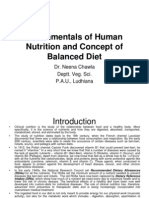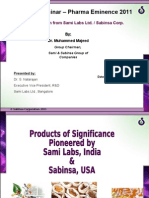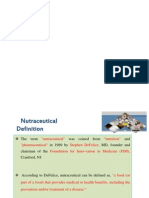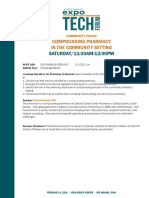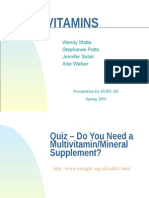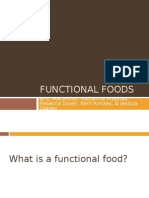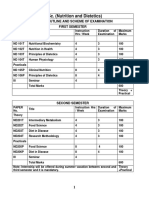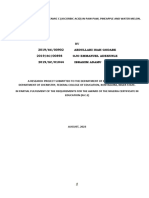Dietary Supplements
Dietary Supplements
Uploaded by
api-315408947Copyright:
Available Formats
Dietary Supplements
Dietary Supplements
Uploaded by
api-315408947Original Title
Copyright
Available Formats
Share this document
Did you find this document useful?
Is this content inappropriate?
Copyright:
Available Formats
Dietary Supplements
Dietary Supplements
Uploaded by
api-315408947Copyright:
Available Formats
DIETARY SUPPLEMENTS
Natalie DeRusha and Ana Sesatty
What is a dietary supplement?
Product that contains a dietary ingredient
Intention: add further nutritional value to
the diet
One or any combination
Vitamin, mineral, or herb/botanical
Amino acid
Dietary substance to supplement diet
Extract
Constituent
Concentrate
Metabolite
Various forms of supplements
https://expertbeacon.com/sites/default/files/before_buying_dietary_supplemen
ts_follow_this_advice.jpg
Statistics
Substantial increase of dietary supplement
usage
1988-1994: 42%
2003-2006: 53%
2009-2012: 48.7% used at least
one prescription drug in the past
30 days
Contain the same or a higher amount of
nutrients than the recommended DRIs
Significantly contribute to total dietary
intake
Statistics
In 2008, a cross-sectional study on prevalence
and patterns of medication usage and possible
drug-drug interactions
3,005 community individuals
Ages: 57 to 85
The
results
81% used at least one medication
42% used one-over-the-counter medication
49% used a dietary supplement
52%: Prescription medication users &
concurrent use of dietary supplements
Public Health Issue
Dietary Supplement Health and Education Act (DSHEA)
Allows manufacturers to place products on the market as food products
FDA is unable to regulate as drugs & validate market claims
New Dietary Ingredient (NDI) application
FDA reviews and determines if safe to market
Safety data & product efficacy is not required
End result-> substantial health risk to the public
Misguided health claims & availability -> pose a health risk to the public
Consumers consider supplements safe because they are natural
Public Health Issue
Main reason supplements pose a health risk
Unsafe products have forced their way into the market
Detrimental adverse reactions are reported
Potency of dietary supplements
Dosage & purity: lack of federal standards
Standardization process
Lack of batch consistency
Result: variation of active ingredients
Prospective dangers to the public
Inadvertent drug reactions
Toxicity
Adulteration with contaminants
Dosage variability
Risk to special populations
http://www.ironmagazine.com/images/supplements-ban.jpg
Economic risks
Regulation
U.S. Food and Drug Administration (FDA)
o
Regulates the processing, manufacturing, packaging, handling, and labeling of dietary
supplement products.
under the Dietary Supplement Health and Education Act of 1994(DSHEA)
New dietary ingredients (NDI)
Good manufacturing practices (GMPs)
Labeling
Claims
Regulation
Public Health Security and Bioterrorism Preparedness and Response Act
Dietary Supplement and Non-prescription Drug Consumer Protection Act
Nutrition Labeling Education Act (NLEA)
Food Safety Modernization Act
Federal Trade Commission (FTC)
http://www.baronforex-edu.com/?page_id=276
New Dietary Ingredients (NDIs)
Defined as a dietary ingredient in a dietary supplement that was not sold in the U.S. prior
October 15, 1994.
o Before 1994, manufacturers were not required to inform the FDA of ingredients
Ingredient notification to the FDA 75 days before placed on market
NDIs must not be chemically altered or must have reasonable safety evidence
o What is considered reasonable evidence of safety?
o In 2011, drafted new guidelines mandating more comprehensive safety and toxicology
testing
o Received pushback from manufacturers and agreed to revise guidelines in 2012
o FDA has not published revised NDI guidelines
Good Manufacturing Practices (GMPs)
Minimum standards to ensure safety and quality of production, processing, packaging,
handling, and labeling of dietary supplement products
Goal
o
o
o
o
Require manufacturers to have a batch production record and a master manufacturing record
of batch size, weight, concentration, and strength of each dietary supplement
Designed to ensure a consistent product and not to ensure the safety of ingredients
is to prevent
Addition of wrong ingredients
Excess or not enough of an ingredient
Reduce risk of contamination
Inappropriate packaging and/or labeling of products
Labeling
FDA requires dietary supplement products to include the following information:
o
Name of dietary supplement
Dietary supplement amount
Supplement Facts Panel
Ingredient list
Name and location of manufacturing, packaging, or distributing business
www.justlabelit.org
Claims
Manufacturers can not make health claims
o FDA can approve health claims
Product must meet significant scientific agreement (SSA)
Significant scientific evidence
Well-established and recognized scientific procedures
Qualified experts support claim
Manufacturers are allowed to make structural and functional claims
o Examples:
Helps reduce weight and body fat
Improves memory, concentration, and learning
Boosts the immune system
Disclaimer is required stating that claim has not been evaluated by the FDA and the product
is not intended to diagnose, treat, cure or prevent disease
Drugs vs Dietary Supplements
Both regulated by the FDA
Drugs require FDA approval and must be proven safe and effective by substantial evidence
through various clinical trials before entering the market
o Required information in package labels:
Proven treatable conditions
Side effects
Contraindications
Unsafe interactions with other drugs
Dietary supplement manufacturers DO NOT require FDA approval to produce and/or sell
products
o Only requires reasonable safety proof for NDIs
o FDA recalls and acts against dietary supplements only after product has reached the
market and proves to have a significant health risk to the population
Programs
USP Verified Dietary Supplements
Ensure the dietary supplement supply
Set standards
National Nutritional Foods Association (NNFA)
TruLabel Program
GMP Certification Program
http://www.usp.org/usp-verification-services
National Sanitation Foundation International (NSF International)
NSF Dietary Supplements Certification Program
http://www.npainfo.org/NPA/Education
Certification/TruLabelProgram.aspx
http://www.nutrigrass.com
http://www.barwismethods.com
Proposed Regulation & Policy
Required rigorous scientific testing by FDA
Proof of purity, safety, efficacy, & nutrient value
FDA approval
Based on scientific evidence
Controls availability
Labeling authorization
FDA approval for labeling health claims & structural/functional claims
Must be scientifically proven through significant scientific agreement (SSA) standards
Dietary supplements
Remove from over-the-counter
Place behind the counter in pharmacies & retail stores
Controls accessibility
Proposed Regulation & Policy
Fact sheets
Include
DRIs for each population
Possible drug interactions
Vitamin/mineral toxicities
Reported adverse effects
Explanation of content prior to release
Evaluation
Dietary supplement use through NHANES
https://sciencebasedpharmacy.wordpress.com/2009/12/26/d
o-the-natural-health-products-regulations-benefit-canadians/
Proposed Initiative
Dietary Supplement Safety and Quality Initiative
o Create awareness that most dietary supplements have not proven:
Safety
Efficacy
Quality
o Dietary supplements DO NOT substitute food
Establish a government based campaign
o Similar to current CDC campaigns
o Nationwide TV advertisement
o Partner with state health organizations
o Website to include resources on:
Supplement Facts Panel labels
Current regulations
Evaluation
o Dietary supplement sales
http://www.cryptosavvy.com/media/Dietary-Supplements-andMedications.jpg
You might also like
- Quality Assurance For Medical CannabisDocument12 pagesQuality Assurance For Medical CannabismdbackesNo ratings yet
- Combined USP36NF31S1 PDFDocument495 pagesCombined USP36NF31S1 PDFgeeenaa100% (2)
- Whipple Procedure Case Study PresentationDocument30 pagesWhipple Procedure Case Study Presentationapi-315408947100% (3)
- FDA 101 Dietary SupplementsDocument3 pagesFDA 101 Dietary SupplementsFI8TZNo ratings yet
- Dietary Supplement RegulationDocument2 pagesDietary Supplement Regulationjbabu123No ratings yet
- Guidelines for Measuring Household and Individual Dietary DiversityFrom EverandGuidelines for Measuring Household and Individual Dietary DiversityNo ratings yet
- Ascorbic Acid InjectionDocument6 pagesAscorbic Acid InjectionMaria NorilynNo ratings yet
- Basic Castile CPLS Tutorial & HelpdocsDocument9 pagesBasic Castile CPLS Tutorial & HelpdocsDorina MogildeaNo ratings yet
- Formulation and PackagingDocument42 pagesFormulation and PackagingMinh Tuấn100% (1)
- Every Vitamin PageDocument9 pagesEvery Vitamin Pageapi-3740719100% (1)
- Dietary-Supplements Overview PDFDocument167 pagesDietary-Supplements Overview PDFAnonymous TDI8qdYNo ratings yet
- Vitamins Are Organic Compounds Required in The Diet in Small Quantities To Perform Biological FunctionsDocument70 pagesVitamins Are Organic Compounds Required in The Diet in Small Quantities To Perform Biological FunctionsRose LiteNo ratings yet
- Neutraceuticals-2020Document35 pagesNeutraceuticals-2020Sbahat FatimaNo ratings yet
- Probiotics For The Treatment of Bacterial VaginosisDocument30 pagesProbiotics For The Treatment of Bacterial VaginosisNicanor Jauregui ToledoNo ratings yet
- Nutraceutical PDFDocument77 pagesNutraceutical PDFIndahNo ratings yet
- Human NutritionDocument42 pagesHuman Nutritionila03100% (2)
- Pioneered Products of Sabinsa - Sep 16, 2011Document95 pagesPioneered Products of Sabinsa - Sep 16, 2011ameers333No ratings yet
- Approved SupplementsDocument229 pagesApproved SupplementsNicole Ericka B. NuñezNo ratings yet
- New PPT SeminarDocument48 pagesNew PPT SeminarDhinesh KumarNo ratings yet
- Sterile ProductsDocument19 pagesSterile ProductsManasvi MehtaNo ratings yet
- Health Benefits of Functional FoodDocument46 pagesHealth Benefits of Functional FoodTina TalmadgeNo ratings yet
- AnicDocument26 pagesAnicpalkybdNo ratings yet
- Water Soluble VitaminsDocument33 pagesWater Soluble VitaminsRhomizal Mazali100% (1)
- Herbal Drug Regulation PDFDocument4 pagesHerbal Drug Regulation PDFPrathamesh KhotNo ratings yet
- Effect of Adaptogens On The Central Nervous SystemDocument23 pagesEffect of Adaptogens On The Central Nervous SystempnutsterNo ratings yet
- Black Seed OilDocument23 pagesBlack Seed Oilakhil100% (1)
- Compounding in Community SettingDocument19 pagesCompounding in Community Settingkhangsiean89100% (1)
- Regulatory Issues For Herbal Products - A ReviewDocument12 pagesRegulatory Issues For Herbal Products - A Reviewvishal sachan100% (1)
- 51 Worst Diseases and Conditions To Treat With Black Seed OilDocument9 pages51 Worst Diseases and Conditions To Treat With Black Seed Oilsyndicate_mauliNo ratings yet
- Guidance Document Nutraceutical 18 05 2018 PDFDocument104 pagesGuidance Document Nutraceutical 18 05 2018 PDFsridharanNo ratings yet
- Oral and Dental Health Lecture SlidesDocument33 pagesOral and Dental Health Lecture SlidesPrincess VanquirayNo ratings yet
- WHO Herbal Extraction GuidelinesDocument60 pagesWHO Herbal Extraction GuidelinesSemwanga Godfrey100% (1)
- 19 Probiotics PrebioticsDocument22 pages19 Probiotics PrebioticsGâtlan Lucian100% (1)
- Anti-Diabetic Medication - Wikipedia, The Free EncyclopediaDocument12 pagesAnti-Diabetic Medication - Wikipedia, The Free Encyclopediaumesh123patilNo ratings yet
- Handbook of Minerals As Nutritional Supplements PDFDocument254 pagesHandbook of Minerals As Nutritional Supplements PDFMelissa STanNo ratings yet
- VitaminsDocument94 pagesVitaminsFerdauza TupasNo ratings yet
- Draft Food Safety and Standards Proposed (Labelling & Display) Regulations - An OverviewDocument16 pagesDraft Food Safety and Standards Proposed (Labelling & Display) Regulations - An OverviewGajendra Singh Raghav100% (1)
- What Is DetoxificationDocument6 pagesWhat Is DetoxificationLaila AbdulNo ratings yet
- 70 Questions For The FDA Inspection - Dietary SupplementsDocument8 pages70 Questions For The FDA Inspection - Dietary SupplementsSamuel ChewNo ratings yet
- Vitamin D: World's Healthiest Foods Rich in VitaminDocument13 pagesVitamin D: World's Healthiest Foods Rich in VitaminGusti Arya YunediNo ratings yet
- Crohns Disease Nutrition PDFDocument4 pagesCrohns Disease Nutrition PDFSher Lee HoNo ratings yet
- Probiotics GuidelinesDocument20 pagesProbiotics GuidelinesMadan Mohan Sharan SinghNo ratings yet
- Food Fortification PDFDocument7 pagesFood Fortification PDFHoman MetsNo ratings yet
- Functional Foods PresentationDocument81 pagesFunctional Foods Presentationbrittmacarthur583% (6)
- Food Processing and PreservationDocument119 pagesFood Processing and PreservationMuhammed Adem100% (1)
- Product Formulation and SpecificationDocument11 pagesProduct Formulation and SpecificationOkello GodfreyNo ratings yet
- Samidirect Business ManualDocument18 pagesSamidirect Business ManualHsp FrndNo ratings yet
- I VC GuidelinesDocument18 pagesI VC GuidelinesAshley Diane HenryNo ratings yet
- Nutrition Syllabus MSCDocument38 pagesNutrition Syllabus MSCdrrselvaraj100% (2)
- Microbiological Safety of Dried Spices and HerbsDocument5 pagesMicrobiological Safety of Dried Spices and HerbsJorge Rodríguez BustosNo ratings yet
- Stability Testing of Natural Products - 2003Document76 pagesStability Testing of Natural Products - 2003phkakrani83% (6)
- Guide To U.S. and Canadian Nutrition Labeling Regulations: Questions & Answers 2004 UpdateDocument20 pagesGuide To U.S. and Canadian Nutrition Labeling Regulations: Questions & Answers 2004 UpdateRamil DumendenNo ratings yet
- (첨부 1) Guideline for Registration of Medicines (FMHACA)Document8 pages(첨부 1) Guideline for Registration of Medicines (FMHACA)Talha MuhammadNo ratings yet
- Classification of Nutraceutical ProductsDocument32 pagesClassification of Nutraceutical Productsnonick18100% (2)
- Developing A Green Tea Based Natural Energy DrinkDocument43 pagesDeveloping A Green Tea Based Natural Energy DrinkLyn Lynettelyn100% (1)
- Vitamin and Mineral ChartDocument4 pagesVitamin and Mineral ChartJagan LogaiyaNo ratings yet
- International Food Standard Setting PrioritiesDocument21 pagesInternational Food Standard Setting PrioritiesCanadaForCodex100% (1)
- Drug RegulationsDocument9 pagesDrug RegulationsfsdfNo ratings yet
- Evidence Base Guidelines (EBG) in Nutrition PracticeDocument13 pagesEvidence Base Guidelines (EBG) in Nutrition Practiceimnas100% (1)
- Fda and Who Guidelines ForDocument24 pagesFda and Who Guidelines ForJaveria AjazNo ratings yet
- Week5. Roles of PharmacistsDocument38 pagesWeek5. Roles of PharmacistsKathleen GasparinNo ratings yet
- CSL Logic ModelDocument2 pagesCSL Logic Modelapi-315408947No ratings yet
- Myplate HandoutDocument1 pageMyplate Handoutapi-315408947No ratings yet
- Healthy Eating On CampusDocument2 pagesHealthy Eating On Campusapi-315408947No ratings yet
- Ana Sesatty RD Resume Revised PDFDocument2 pagesAna Sesatty RD Resume Revised PDFapi-315408947No ratings yet
- Arfid WorkbookDocument53 pagesArfid WorkbookhschlangenNo ratings yet
- Article Writing worksheetDocument6 pagesArticle Writing worksheetbilolbek424No ratings yet
- Form 4 Biology Scheme of Work term 1 2024-25Document9 pagesForm 4 Biology Scheme of Work term 1 2024-25mr.francoisNo ratings yet
- The David Laid Workout and Diet Plan - SET FOR SETDocument1 pageThe David Laid Workout and Diet Plan - SET FOR SETreedjjloperNo ratings yet
- ROUGHDocument19 pagesROUGHSamadNo ratings yet
- Course Plan Applied Biochemistry (BSC Nursing)Document6 pagesCourse Plan Applied Biochemistry (BSC Nursing)ALAN SEBASTIANNo ratings yet
- Diet and Dental CariesDocument38 pagesDiet and Dental CariesShivani DubeyNo ratings yet
- Assessment of The Knowledge and Attitude of Infants' Mothers From Bushehr (Iran) On Food Security Using Anthropometric Indicators in 2016: A Cross-Sectional StudyDocument13 pagesAssessment of The Knowledge and Attitude of Infants' Mothers From Bushehr (Iran) On Food Security Using Anthropometric Indicators in 2016: A Cross-Sectional Studynewbire vlogNo ratings yet
- Life Processes Notes (Nutrition)Document7 pagesLife Processes Notes (Nutrition)yash.discordnitroNo ratings yet
- Extreme Muscle BuilderDocument2 pagesExtreme Muscle Builderkbozic1998No ratings yet
- Detailed Lesson Plan in Tle-He Grade 6Document7 pagesDetailed Lesson Plan in Tle-He Grade 6Jezreel Clyde D. Luna100% (1)
- Alteration of Metabolic Profiles in Young and Adult Murrah Buffaloes Exposed To Acute Heat StressDocument8 pagesAlteration of Metabolic Profiles in Young and Adult Murrah Buffaloes Exposed To Acute Heat StressAna Júlia LogradoNo ratings yet
- Schools Should Use FilmsDocument10 pagesSchools Should Use FilmsDoniyorbek KarimjonovNo ratings yet
- Rid 9141 Rotaract CalendarDocument4 pagesRid 9141 Rotaract Calendaredmunda akatakpoNo ratings yet
- Ab 21 0460Document8 pagesAb 21 0460faza baihaqiNo ratings yet
- The Finishing TouchDocument20 pagesThe Finishing Touchajaychandrac7No ratings yet
- Copy of Life Cycle Nutrition NotesDocument6 pagesCopy of Life Cycle Nutrition NotesSirly Guevara-Mejia Student - SandersonHSNo ratings yet
- PATHFIT NutritionDocument17 pagesPATHFIT Nutritionnickole.canoNo ratings yet
- Pineapple PieDocument3 pagesPineapple PieSarah May Tigue TalagtagNo ratings yet
- Assignment 3 Would - Used To B1 LevelDocument3 pagesAssignment 3 Would - Used To B1 LevelValentina Diaz CastroNo ratings yet
- Dog Food RecipesDocument284 pagesDog Food RecipesBusyNo ratings yet
- English-Through-Reading Answer KeyDocument10 pagesEnglish-Through-Reading Answer KeyugurkaragulleNo ratings yet
- Naturally You Magazine Spring 2005Document48 pagesNaturally You Magazine Spring 2005michelletasaNo ratings yet
- Reflection by Andrew F. RabalDocument2 pagesReflection by Andrew F. RabalNad DeYnNo ratings yet
- Vi. SOAL PASDocument6 pagesVi. SOAL PASMTs Al IstiqomahNo ratings yet
- The Withered Arm (2) ç2Document21 pagesThe Withered Arm (2) ç2Elif AkayNo ratings yet
- Breast Milk: Benefits & BarriersDocument22 pagesBreast Milk: Benefits & BarriersNazia ArifNo ratings yet
- Swiss Chard Crustless PieDocument1 pageSwiss Chard Crustless PieMaureen DurkinNo ratings yet
- How To Eat Plant-Based: SuccessfullyDocument14 pagesHow To Eat Plant-Based: SuccessfullyFabian MesselNo ratings yet
- Therapeutic Diets (Nida Qadri) .-1Document44 pagesTherapeutic Diets (Nida Qadri) .-1maryam khanNo ratings yet















